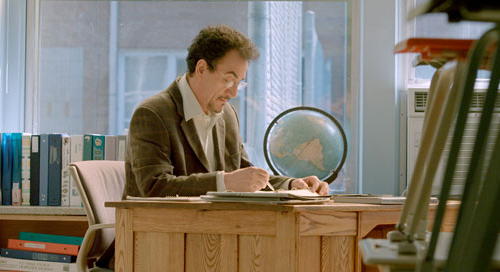One of my favorite movies of 2012.
This review previously appeared (in a slightly different form) in ICON and is reprinted with permission.
******************************
Assemble the right snippets of everyday life and there's
extraordinary drama: a marriage that finds redemption, a friendship that goes
sour, or in the case of the fantastic Canadian import, Monsieur Lazhar,
a job that yields unexpected pains and pleasures.
Philippe Falardeau's masterpiece of economy (and a 2011
Oscar nominee for best foreign film) takes places in a French-speaking middle
school in Montreal, the kind of free-minded institution where the kids call the
teachers by their first names and the classrooms are decorated like a birthday
party. That tranquility is shattered when a popular young teacher, Martine
(Héléna Laliberté), hangs herself in her own classroom.
It's an act that leaves students and faculty stunned. Soon
after, polite, regal Bachir Lazhar (Mohamed Fellag) visits the school's
principal (Danielle Proulx) to inquire about the open position. Based on his 19
years of college teaching experience in Algiers and immediate availability,
he's immediately hired. Order has to be restored.
Lazhar starts teaching grammar and composition to 11- and
12-year-olds, but something is amiss. His source material for dictation—what is
this, a 1950s secretarial school?—is Balzac; he disciplines a kid by slapping
him in the back of the head. Oh, and there will be no semi-circles here. Lazhar
isn't being rebelliously old school. He has no relevant experience. In Algeria,
Lazhar was a civil servant before running a restaurant. His wife was a teacher
until her inflammatory criticism of the Algerian government got her and their
two children killed. Lazhar was already in Montreal, preparing for a reunion
that never happened. Now he's a refugee with deportation looming over his head.
Falardeau shrewdly uses Lazhar's duplicity to establish the
character's fragile soul and to reveal the stifling sterility of today's
teacher-student relationship. That means Lazhar cannot fill the hole left in
his life and the kids become the victims of stone-faced policy. Teachers can't
touch anybody, even out of compassion. If you talk about feelings, bring in the
school psychologist and leave the room. The days of a teacher having any real
influence are over. After Lazhar mentions a student's personality tic to her
parents, her father huffs, "We prefer that you teach our daughter, not try
to raise her."
Isn't the latter part of that concern crucial in teaching
children, especially when the parents aren't around? Lazhar does develop a
rapport with the precocious and lonely Alice (Sophie Nélisse). Mom is an
airline pilot and Alice isn't on speaking terms with her friend Simon (Émilien
Néron), whom she blames for Martine's death. Lazhar is someone she can actually
talk to, and the only who listens. She reads an essay about her conflicted
feelings for Martine in his class. Afterward, he begs the principal to
distribute copies throughout the school. The request is denied. When Lazhar
tells the kids that the classroom is a place of life, it's a plea, not a fact.
Little moments like this—refreshingly free of musical or
visual cues—are strung together like pearls, a nice change from most dramas,
which unload pathos with the eagerness of a 2 for 1 sale. The young lovers will
die for each other; here is the saccharine wedding vows/sensually lit sex scene
to prove it. Mom and dad disapprove of the union: behold their icy stares.
Falardeau understands the powerful beauty that comes in letting a story tell
itself. Alice eats a meal as her mom rushes to her next destination. Grading
papers, Lazhar sees the sun peek through the branches, and we know he's finally
found a sliver of contentment. By trusting the material and the
performances—Fellag is terrific because Lazhar never appears comfortable in his new
life—Falardeau can let everything unfold without dramatic fireworks.
When Lazhar's ruse is discovered, forcing him to give up his
class, we feel the cumulative weight of every tiny gesture, every silent
movement. Moments later, we're offered a farewell that tears our heart while
massaging our soul. Only then do we realize just how beautiful movies can be
when they aren't in such a rush to tell us how to feel. [PG-13]


No comments:
Post a Comment